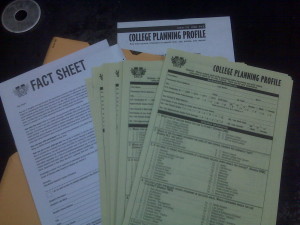 At the beginning of each year, I usually receive an onslaught of survey material for my students to fill out. These surveys are not supplied by the school or district, and usually query students about their backgrounds, interests and future plans.
At the beginning of each year, I usually receive an onslaught of survey material for my students to fill out. These surveys are not supplied by the school or district, and usually query students about their backgrounds, interests and future plans.
While some teachers diligently have students complete them immediately, others simply use this material for ‘filler’, administering the survey when they have a few extra minutes in class. The ones addressed to me take a two-step journey to the recycle bin.
I have always been curious about how these surveys are used, and apparently I am not alone. In fact, the Educational Research Center of America, Inc (ERCA) recently (October 2008) agreed to change its practices for obtaining and handling personal information it collects from high school student surveys, under an agreement reached with the Attorneys General of 36 states and the District of Columbia. See press release from Maryland.
Wisconsin is not on this list.
Nonetheless, my policy has been to avoid distributing these surveys for a variety of reasons:
- Administering a survey to my students is clearly a waste of my precious classroom time. I can think of a hundred curricularly appropriate things to do with 20 minutes than cater to the wishes of a company masquerading benefits to me and to my students.*
- This information is a marketing tool, and is sold to interested parties. I believe it is irresponsible to use taxpayer money to facilitate their business model.
- I am always weary of surveys that collect student information other than for blind research practices. As we continually preach to students about protecting their online identities, we should model the same practice in school as well.
- In this day and age, students have many more options available to them in finding information about their future. The fact that I don’t need to say the “I” word simply illustrates my point.
*There are a few entities that sell “educational products” and entice educators with freebies and other benefits in the name of education. The bottom line is that they are businesses whose fundamental goal is to make money; beware of the wolf in sheep’s clothing.